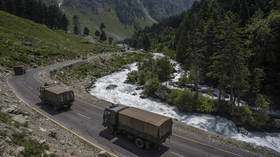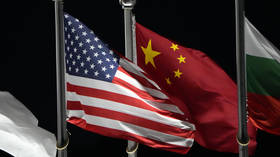
Beijing insists the border is stable and has called on New Deli to help uphold peace in the region

FILE PHOTO. An Indian army convoy drives towards Leh, on a highway bordering China in Gagangir, India. © Yawar Nazir/Getty Images
Beijing has been accused of trying to “unilaterally” change the status quo on the disputed Himalayan border between India and China, according to a statement by India’s defense ministry on Tuesday.
Indian and Chinese troops clashed in the northeastern Indian state of Arunachal Pradesh last week, marking the first altercation between the two nuclear-armed powers in nearly two years. New Delhi said soldiers from both sides sustained only minor injuries. AFP reported at least six Indian soldiers were injured in the scuffle.
Indian Defense Minister Rajnath Singh claimed the December 9 incident was provoked by Chinese troops who attempted to cross the border. “The ensuing faceoff led to a physical scuffle in which the Indian Army bravely prevented the PLA from transgressing into our territory and compelled them to return to their posts,” Singh said.
The fighting was reportedly resolved rather quickly as commanders from both sides sat down to discuss the situation. According to Singh, the Chinese side was asked to “refrain from such actions and maintain peace and tranquility” along the border.
Beijing, however, does not seem to have acknowledged that a confrontation took place. On Tuesday, China’s foreign ministry spokesman, Wang Wenbin, insisted the “China-India border area is generally stable” and noted that both sides continued to hold “smooth communications” on border-related issues. Wang did not provide any details on the scuffle, nor did he say how many Chinese troops were injured in the fight.

Read more
The spokesman did state that Beijing hopes the Indian side will “advance in the same direction as China,” and work together to “uphold the peace and tranquility of the China-India border region.”
The nearly 3,500 kilometer Himalayan border has long been a point of contention between the two Asian states. In 1962, China and India fought a full-scale war for control of the area, which Beijing claims in its entirety and considers part of Tibet. Hand-to-hand fighting broke out along the line in 2020 after China objected to India’s construction of a road in its claimed territory. India said it lost around 20 troops killed, while China claimed to have lost four.
Tension on the border has escalated recently. India and the US held joint military exercises in the region last month, much to the ire of Beijing, which said such drills did “not help build bilateral trust.”




